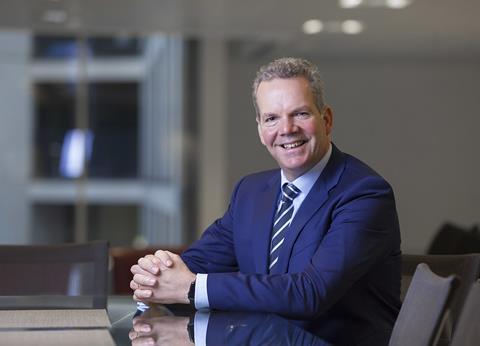
UK: ‘Disappointing’ is Transport for the North’s reaction to the National Infrastructure Commission’s recent Rail Needs Assessment for the Midlands & the North report, which suggested a significant scaling back of projects including Northern Powerhouse Rail and the eastern leg of High Speed 2 because of insufficient funding.
Speaking to Rail Business UK, TfN Chief Executive Barry White said the report ‘was set up as an exercise to integrate, phase and sequence, and it has turned out as an exercise in pitching regional links versus long distance links’.
‘We don’t really see it that way at all’, White explained. ‘HS2’s Eastern leg, for instance, connects Leeds, Sheffield, in part through NPR as well. But it also goes down to Nottingham, Derby and Birmingham.’
‘Operating within their fiscal remit of 1·2% of GDP, NIC probably did the job they felt they had to do’, said White. Ultimately, ‘all the decisions are the government’s, the Treasury sets 1·2%’, and TfN will be encouraging the government to revise this figure upwards’.
White felt NIC had confused major projects with routine expenditure, commenting that ‘we were promised there were separate pots and they would always be treated separately; what they have done is mixed mega-rail and day-to-day rail.’
Core and adaptive approach
TfN is particularly critical of what NIC calls a ‘core and adaptive approach’, which White says is fundamentally flawed.
‘It means you do a bit, and then you think about whether you do the rest of it. One example is saying we’ll do a bit of new line from Manchester heading towards Leeds, and then we will link that back to an existing railway line. But we will go via Bradford, eventually.
‘Core and adaptive to me means piecemeal. What that means practically is, if you are a business thinking about building an office in Bradford, there’s no sign when that follow-on project might happen so you build your office block somewhere else.
‘If the whole aim was to give confidence that this would be delivered as a network, then core and adaptive cuts right across that thought.’
Ever the optimist
White suggests that there is still hope that the government will stick to commitments regarding investment in the north’s infrastructure.
‘I’m ever the optimist. I actually do believe this is a government that is serious about levelling up and investing in the north, and therefore their response to this is going to be really interesting. 10 months ago the Prime Minister said “we’re doing HS2 in full”. They have been very committed to NPR; let’s make that a clear commitment, so that everybody knows if there is enough money to deliver the whole network then that is what we should be trying to do as a country.
‘I really think this stop-start nature is unhelpful, and please let’s not have another review.’
While pointing out that ‘I feel very passionate about HS2’s Eastern leg’, White confirmed that TfN was ‘keeping our foot on the gas in terms of doing the next business case’ for NPR. ‘We are on track to have that ready for March, and we will keep doing that. And we have co-planning with DfT so if they tell us to stall, we’ll have to have that discussion with them.’
Stark challenges
White said the three budget scenarios for rail projects proposed by NIC present some stark challenges.
‘There are three scenarios; the zero or baseline budget, plus 25% and plus 50%. The zero budget doesn’t give us NPR at all, 25% gives us elements of NPR but it is a very unpalatable mix, and then 50% starts to look like something close to NPR, although not quite. So there is hope for NPR, if government were to set up a funding envelope, but we need something in addition to that, to allow the eastern leg of HS2 to be built as well.’
Pipeline of work
White notes that NIC appears to have treated HS2 and NPR as separate projects, despite its remit and extensive work to explain the way the two schemes overlap.
‘HS2 and NPR are joined up schemes that are the motorway for the railways and need to happen together. There are a lot of people who have finally understood the way that they work together, and just at that point there’s an unhelpful report that sort of says, “look at them in isolation” again.’
White agrees with NIC suggestions that some schemes should be progressed more quickly, including the Transpennine Route Upgrade and Midland Main Line electrification.
‘What we would like to see is that pipeline of work being there, so that the unit costs can be driven down and efficiencies could be there. I always slightly flinch with anybody calling TRU a quick win. It could be accelerated, but it has had three laps around the track already. I think we will see progress on TRU on the ground, we do think progress can be made and that would be great.’
Post-coronavirus recovery
Whichever schemes do progress, White issues one final caution in light of the need for a post-coronavirus recovery.
‘What we need to be careful about is any disruption on the railway that affects the city economies. Part of the Covid-19 recovery plan will be about getting leisure travellers coming back into cities at weekends; it’s going to be getting people back into restaurants, shops and cultural venues.
‘There is a lot of stuff we have to re-start to liven up the city economies again, so the old Network Rail model of having big blockades at weekends is the sort of stuff we have to think about and work through.’



